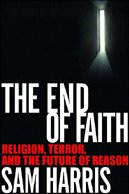
Sorry, I'm a little late in posting the weekly entry! I've been working on an essay called
"Naturalistic Interpretations of Karma and Rebirth" which I had hoped to be the entry, but it needs more time in the oven.
At my local Humanist group meeting, we discussed Sam Harris' new book,
The End of Faith, after watching a video of the author discussing it. I have read the opening ten pages available online and several reviews, and then later got a good overview of the content through the video and our questions and discussions (many at the meeting had read the book). Therefore, I would not consider the following a review of the book as a whole, but would like to address some ideas discussed by us.
Sam Harris points out the harmful aspects of faith-based beliefs and religions. This, of course, is nothing new except for the fact of the book referencing our current (I hate this phrase) post 9/11 world. In kind, Harris opens the book with an emotional tale of a suicide bomber carrying out the dirty deed. This emotionally-charged opening gave me some concern as to Harris' approach.
A big point Harris seems to make is that we need to stop respecting these various unproved (or sometimes even unprovable) religious views. He rightly illustrates that the nature of these beliefs are such that if a similar belief was held outside of the religious sphere, we would label such people as kooks (my phrasing). He notes that faith acts as a 'conversation stopper' preventing any sort of rational critique. Adding examples of these beliefs' harmful effects on our behavior, he suggests that it is time to remove the social stigma of outwardly questioning the faith of other people.
I can agree with the harmful effects he outlines. I can also agree with the irrationality of faith-based thinking (see my
PoSPH, 1.2). I can
even agree that there shouldn't be a stigma on questioning faith. But I think Harris overstates his case in many instances, and in some it is a little concerning. For instance, in his opening Harris says:
"I hope to show that the very ideal of religious tolerance - born of the notion that every human being should be free to believe whatever he wants about God - is one of the principal forces driving us toward the abyss."
Consider this sentence carefully to fully grasp what he is saying here. Consider it first without the caveat between the dashes: "I hope to show that the very ideal of religious tolerance is one of the principle forces driving us toward the abyss."
So, Harris seems to be positing a secular world in which it isn’t simply a hands-off government and community ethos that allowed freedom of belief, but actually a forced-secularism by decree or active pressure.
Now consider the portion within the dashes: "born of the notion that every human being should be free to believe whatever he wants about God". This is how he describes the "religious tolerance" that is driving us toward the abyss. By implication, assuming Harris thinks we should not go toward the "abyss", we can deduce that he
must be saying the following...
'Every human being should NOT be free to believe whatever he wants about God.'
If this is the case, how are incorrect thoughts to be monitored and enforced in Harris’ ideal world? I should grant that Harris said in the video that he is not proposing legislation, but merely a shift in public social norms that would enable us to call believers out on their absurd beliefs more openly. But in many other places in both the book and the video we saw, Harris seems to imply a world where believers are shunned, find it difficult to work in high offices and positions, and are generally marginalized. Harris would seem to me to favor the French approach of 'forced secularization on the people' rather than the American approach of government neutrality toward religion which, if true, is unfortunate and misguided.
This is even more concerning when one considers his rather lengthy criticism of religious moderates. In these instances he doesn't seem to understand their position very well at all. So much so that I wonder how many conversations he's actually had with moderates.
Lastly, the entire position of his book seems to lack any sort of pragmatic reality. How is such a society where faith-based believers are shunned to exist where the vast majority
are those believers? How will non-believers making outward jerks of themselves in the eyes of believers do anything other than result in their own marginalization? How are these religions to improve or find their way out of fundamentalism without the assistance of the moderates (since they too are being criticized without respect)? Harris doesn't seem to appreciate what would be the disastrous effects for both the religious and the non-religious if the minority of folks who identified with his book were to take on this approach.
The key issue here is understanding what
respect is all about, especially where religious differences are concerned. After the meeting, one attendee (and a good friend) mentioned that he felt the strongest point of Harris book which moved him most was that we don't need to respect these views that are based on no evidence and are so often harmful. But what does that entail? If we take on that notion, what will we say in the presence of believers that we didn't before? What will we do that we didn't before? When I consider this I can only surmise that it would be a negative for both parties.
Harris seems to misunderstand the very notion of what respect for others' religious beliefs entails. He says:
"Many religious moderates have taken the apparent high road of pluralism, asserting the equal validity of all faiths, but in doing so they neglect to notice the irredeemably sectarian truth claims of each."
What? I know of few moderates who would believe that all faiths are equally valid when it comes to their truth claims. This is not what respect for the religious beliefs of others entails and this is not a necessary feature of religious moderation.
To have respect for the religious beliefs of others doesn't mean that you must consider them to be true. It doesn't even mean that you must consider them to be a reasonable
possibility. You can, in fact, be quite confident that their beliefs are absolutely false and baseless, and yet have respect. You can even openly discuss your thoughts on their beliefs and yet have respect.
This is because this sort of respect is not respect for the beliefs, but for the
believer. Unless they are the minority of charlatans who have mal intent and are using religion to further their cause, most people believe what they do because they have been convinced that these beliefs are true and right. What that means is that these are fellow human beings on the same quest as we: the quest to find Truth, Beauty, and Goodness.
When you think about it, all good meaning people, whether they believe in God, spirits, rationality, or the cosmos, are seeking Truth, Beauty, and Goodness, and are simply convinced they've found it. At worst, they may be misled. We might even consider some traditions to be diseases of the mind, which cripple adherents' cognitive powers of reason. But even in this case, such people are victims and deserve our compassion.
For us, instead, to think of them as deserving of disrespect would be to make the same error that conservative Christians make in thinking it is just that disbelievers be cast into hell. The error in that case is to assume that what we believe is within our control instead of simply being the result of our experiences. Let us not cast believers into our own sort of hell under the same ill-conceived logic.
This doesn't mean that when they speak of their beliefs we must simply bow our heads and be silent (another seeming misunderstanding of Harris'). But it does mean that we should recognize these people have huge amounts of their time, identity, emotions, and sense of meaning tied up in these beliefs and to simply hit them with a crude sledge hammer is often to crumble the person as well. We should also realize that doing so will only make us out to be villains in the eyes of those with different beliefs than ourselves, and thus increase the tendency toward polarization. If we happen to be in the minority in our culture, the result of this behavior is even more damaging to ourselves.
When it comes to government initiatives and defending our rights we must, of course, act. When it comes to taking a stand, being ourselves without shame, and presenting our beliefs in the open marketplace of ideas we must, of course, participate. Truth is essential and proper for us to seek and share as we will. But, to quote
Parabola Editor Shanti Fader,
truth without compassion is brutality.
The reason we must have respect for others' beliefs is because we want them to have respect for ours. It is because we respect their pursuit of Truth, we respect them as human beings, we respect their
right to freedom of belief and expression. This is not about what we can or cannot say - it's about how we say it and what motivation we have for saying it.
For more on this, I would offer my essay
The Noble Conspectus: Diversity and it's 8-point ethic proposed therein.
I should also note that, in the video, Sam Harris also mentioned the positive aspects of the Buddhist approach to science and investigation of its claims, and offered what I thought was a positive notion that non-believers need to begin addressing these issues of human spirituality and experience through rational means.
In line with that, I would offer what I heard recently suggested at a Buddhist Temple. The Venerable sister Shiou-chih said (paraphrasing as memory allows):
"If you go about saying 'Buddha say..., Buddha say...' they no listen! Just do what you do and show by example. Then soon they ask, 'You are different! What is this?'"
I would offer similar advice to my non-religious friends. Let us show by example the positive, healthy, and happy benefits of living rational lives without superstition. Let us discuss openly but compassionately the benefits of a healthy skeptical approach and finding meaning in this Natural universe. Let us work with moderates on shared values rather than shunning them as some sort of 'lukewarm' drink we might spew from our lips as Jesus is written to have suggested. And let us offer our understanding, tolerance, and yes,
respect, to those of other beliefs as we do these things.
 In what is apparently a common event every hunting season, a pair of deer bucks were found dead after their horns had become locked together. I'm supposing this happens when the bucks are bucking heads in competition for a mate.
In what is apparently a common event every hunting season, a pair of deer bucks were found dead after their horns had become locked together. I'm supposing this happens when the bucks are bucking heads in competition for a mate.





